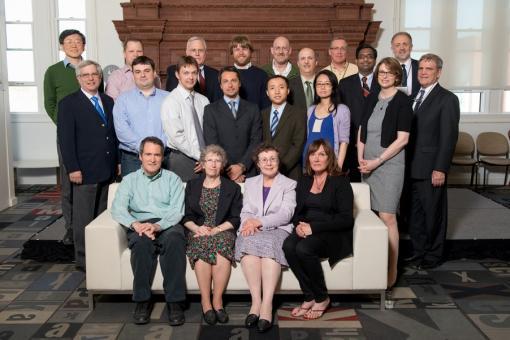
The recipients of this year's Research Seed Grants and Richard B. Salomon Faculty Research Awards were announced at the University Awards Ceremony on May 6. In total, the Office of Vice President for Research will award more than $760,000 in research funding to 40 Brown researchers and scholars.
"OVPR makes these Seed and Salomon Awards to empower faculty research," says Clyde Briant, Vice President for Research. "This year, we provided an unprecedented level of support."
The 2013 Seed Funds went to 24 Brown researchers involved in eight research projects, including three from the School of Engineering. Seed awards are designed to help faculty compete more successfully for large-scale, interdisciplinary, multi-investigator grants. Investigators may propose projects with budgets up to $100,000.
"I'm delighted to highlight research excellence alongside teaching prowess, as they are so often mutually reinforcing," Briant adds.
The three School of Engineering Seed Award research projects are:
Solar Power by Optical Frequency Rectification with Plasmonic Concentrators Coupled to Junctions of Doped Mott Insulators
An alternative paradigm for the conversion of solar energy to electricity makes use of the collective electromagnetic nature of solar radiation instead of individual photons as conventional photovoltaic devices do. The electric field of sunlight is first intercepted by a nanoscale antenna, and then the oscillating electrical current is rectified into a useful DC current. Optical-frequency rectification – in effect a crystal radio that runs on visible light instead of radio waves – avoids altogether the mismatch between the photon energy and the semiconducting bandgap that limits the conversion efficiency of conventional photovoltaic cells. Solar rectification thus has the potential to create a cheaper and more efficient method for the exploitation of sunlight and could lead to a paradigm shift in solar technologies. This team will design and build prototype devices that combine plasmonic concentrators / antennas with novel rectifying junctions of doped Mott insulators to test the feasibility of the concept. A working device will be a compelling argument for external funding.
PI: Brad Marston, Professor, Physics
Co-PIs: Vladan Mlinar, Assistant Professor, Engineering (Research); Domenico Pacifici, Assistant Professor, Engineering; Gang Xiao, Professor, Physics
Funded: $80,000
Three-dimensional Traction Mapping Distinguish Neutrophils from Healthy and Septic Donors
Neutrophils are the most abundant white blood cell in the circulation and are among the first cells to response to an injury or infection; they are essential for health. Patients with decreased numbers of circulating neutrophils, or with inherited defects in neutrophil functions, are susceptible to opportunistic infections and have impaired wound healing. Efforts to study neutrophils under physiologically relevant settings have found that these cells are highly sensitive to physical and biochemical cues that regulate the magnitude of the cellular response to an insult. In order to translate laboratory findings to a better understanding of how the cells function in vivo, this Seed team will study neutrophils in a three dimensional setting rather than on standard 2D surfaces. This synergistic effort between laboratories in the Departments of Surgery at Rhode Island Hospital and the School Engineering will investigate neutrophil tractions in native 3D collagen gels and quantify cellular differences between healthy and septic cells.
PI: Christian Franck, Assistant Professor, Engineering
Co-PI: Jonathan Reichner, Associate Professor, Surgery (Research)
Funded: $50,000
Development of New Computational and Point of Care Platforms for HIV Drug Resistance**
HIV drug resistance is a major cause of treatment failure. The ability to identify drug resistance is important in patient care, and identification of specific drug resistance mutations can assist in efficient regimen design. Resistance testing, required in developed countries, is rarely used in resource-limited settings due to financial and infrastructure constraints. This is a major hurdle in the fight against HIV/AIDS since the vast majority of this pandemic is in resource limited settings. This project builds on preliminary research and a newly-developed microfluidic method termed SMART (Simple Method for Amplifying RNA Targets), to be integrated into a point of care chip platform, for drug resistance detection in resource limited settings. This Seed team will develop a computational platform for global analysis of position-specific pol sequence variation across geographic regions within HIV1 subtypes, develop a SMART Microfluidic Platform to amplify and detect drug resistance in a full-length HIV1 plasmid, and validate the platform in HIV-infected patient samples.
PI: Anubhav Tripathi, Associate Professor, Engineering
Co-PIs: Rami Kantor, Associate Professor, Medicine; Sorin Istrail, Professor, Computer Science; Joseph Hogan, Professor, Biostatistics
Funded: $80,000
**Special Seed award for translational research